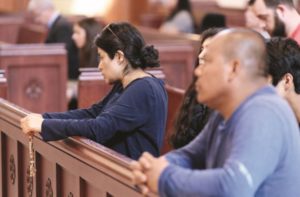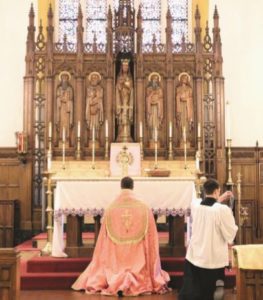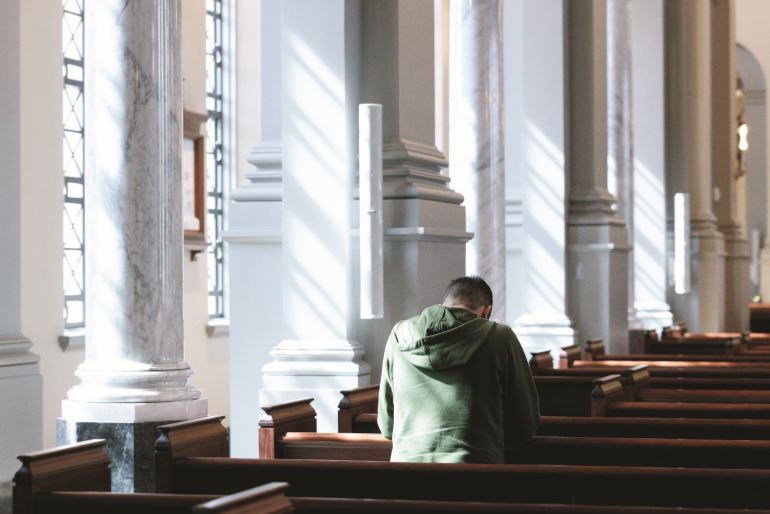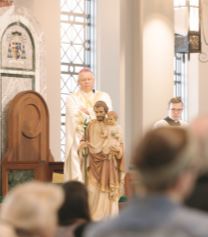Bishop Stika reassures diocese, takes historic safety action due to coronavirus outbreak; Mass suspended
By Bill Brewer
Shuttered stores and schools. Locked restaurants and bars. Dissipated traffic. Silent theaters. Barren grocery shelves. Empty churches.
The novel coronavirus, a mysterious, communicable illness that first appeared on the other side of the world in late 2019, has spread into East Tennessee and cast a shadow on the way residents live, work, and socialize. As the number of cases has increased across the country, federal, state, and local officials have been forced to take actions not seen since influenza and polio epidemics of the early 20th century.
Following the recommendations of public health officials to contain the coronavirus, Bishop Richard F. Stika has taken the unprecedented step of suspending all public Masses in the Diocese of Knoxville until further notice.
And as the virus has continued to spread, with a mounting number of cases in Tennessee, Bishop Stika has extended the suspension of services to Holy Week.
He announced that the Chrism Mass, one of the most solemn and important liturgies of the liturgical year that is held on the Tuesday before Easter, will be postponed and rescheduled.
Priests and parishes from across the diocese join together during the Chrism Mass at the Cathedral of the Most Sacred Heart of Jesus, where Bishop Stika blesses the oil of the catechumens, the oil of the infirm, and the holy chrism.
Also during the annual Chrism Mass, priests in the diocese renew their promises to the bishop.
Holy Thursday and Good Friday public services also are suspended, but priests will be celebrating Easter Masses privately.
Nearly 400 daily and Sunday Masses are regularly celebrated each week at the 51 churches and one Catholic mission in the diocese.
Bishop Stika addressed the recent fear and uncertainty that has gripped communities during the diocese’s last public Mass amid a government-imposed suspension of all public events of more than 10 people.
Tennessee come to terms with school closings, business closings, event cancellations, and sheltering in place, the St. Mary’s Legacy Clinic is continuing to treat patients in six mostly rural communities.
Sister Mariana Koonce, RSM, the physician who serves as medical director of the mobile clinic, is asking patients to notify the mobile clinic staff before their appointment if they have a fever, cough, or shortness of breath, which are symptoms of COVID-19.
Sister Mariana said only patients with appointments will be allowed in the clinic, and individuals who aren’t patients are asked to wait in their vehicles. Patients are asked to practice good hygiene by using hand sanitizer when entering the clinic.
“Considering all that is happening in our world related to COVID-19, we wanted to reach out to everyone. Please know we are committed to the safety of our patients, volunteers, and staff. At this time we are still seeing patients. However, in order to protect everyone, we have made some changes,” Sister Mariana said. “We are eternally grateful for the opportunity to provide care to our patients and to all of our volunteers for their continued support. We will continue to keep everyone updated.”
Sister Mariana also said mobile clinic patients will be asked if they have traveled outside the East Tennessee area.

Bishop Richard F. Stika is encouraging all Catholics to pray the rosary during the coronavirus pandemic that is closing churches to the public, separating people from the sacraments,
Since the outbreak began in the United States in January, the federal government has restricted travel, warning people to not go overseas and use caution in going across the country. In addition to China, areas hardest hit by the virus are Italy, South Korea, Spain, Germany, and France.
A number of pilgrimages from the Diocese of Knoxville to sacred sites in different parts of the world are on hold as tour directors await word on when travel can return to normal.
“It has been heartbreaking for so many…the pilgrims, the guides, the bus drivers, the hotels, the list goes on and on and on. But spiritual graces and lives that are forever touched by a pilgrimage to these holy and sacred sites, and the ripple effect that these pilgrims have when they return spreading God’s love and mercy, is perhaps the most heartbreaking. I know it will return and all of us will come out stronger, and I know God has a plan in it all. Prayers for all as our world journeys through this time together,” said Lisa Morris, a Sacred Heart Cathedral parishioner and representative for Select International Tours, which leads many diocesan pilgrimages.
While she said the situation is heartbreaking for pilgrims and those who provide for them, Mrs. Morris is hopeful the pilgrimages will return.
“Yes I am confident the pilgrimages will return. Pilgrimages have been a part of Church history from the very beginning, just as the Church has gone through its peaks and valleys and we as well. Pilgrimages will return because they draw us closer to God and His Church and each other, changing the world for the better. We as God’s children have that desire written in our heart to make journeys of faith with others to the holy places of God and the saints. There’s no doubt in my mind pilgrimages will go on until the end of time,” Mrs. Morris added.
The power of prayer
For the first time in recent memory, the Vatican was closed to visitors as Rome and all of Italy were placed on lockdown by executive order.
On March 15, Pope Francis left his Vatican residence to pray for those affected by the coronavirus at a crucifix in the Church of San Marcello in the center of Rome. Faithful believe the crucifix helped save Rome from the plague in 1522.
Bishop Stika said he also continues to pray for an end to the pandemic and all the people it has impacted. He is saddened by those who have fallen ill, the businesses and organizations that have been adversely affected, and the impact on the faithful and their parishes.
But he’s hopeful efforts to eradicate the virus will be successful and an effective treatment will be found. He noted how diligently Oak Ridge National Laboratory scientists and their super computers are working to find a drug that kills the virus, as are health-care professionals who are battling its spread.
The bishop thanked the believers and non-believers alike who are helping their neighbors in need, offering hope that has lately been in demand. Until the spread of the virus is arrested and reversed, uncertainty and fear will be in plentiful supply.

Father Michael Hendershott, associate pastor at Holy Ghost Church, leads the benediction concluding adoration on Sunday morning, March 22. He was assisted by seminarian Robbie Bauman.
“Uncertainty is filled throughout the Scriptures. The early Church, the Middle Ages. The uncertainty of life has been a part of our Church since the beginning. Since Moses looked at the bush, since the Israelites traveled through the desert. … I bet you have a certain sense of uncertainty. Right? The uncertainty of the future right now is not defined. Right now is when we live our faith and trust in Jesus. Our Good Friday is probably going to be extended for a while,” Bishop Stika told the congregation at the last public Mass at the cathedral.
The bishop, who marked the 11th anniversary of his episcopal ordination March 19, invoked the intercession of St. Joseph during the Mass. A statue of St. Joseph stood beside him as he delivered his homily, in which he encouraged the congregation and those watching via livestream to follow his episcopal motto: “Jesus, I trust in you.”
“My sisters and brothers, that’s it. Jesus, we trust in you because you will not abandon us,” Bishop Stika said. “If there is any caveat that I want you to take with you today during these moments of uncertainty as we enter our Good Friday, it’s Jesus we trust in you. If you are a member of the Diocese of Knoxville, the decisions that I am making and bishops are making throughout the United States are not arbitrary, are not made to make your life miserable, are not to add to your uncertainty and anxiety. Believe me, I’ve lost sleep. … Every decision I make, in consultation with the vicars general and senior leadership, just like every bishop throughout the world and even the pope, is based on being a good shepherd who cares for his sheep.”
Bishop Stika said he’s still determining the long-term impact on confirmations, first holy Communions, weddings, Hispanic ceremonies, funerals, and other Masses and events if the country still is practicing isolation measures indefinitely. Now, only burial services can take place with no more than 10 family members and friends attending.
The priestly ordination of two seminarians, Deacon Alexander Hernandez and Deacon Zachary Griffith, has been rescheduled from May to August, and it is hoped that the ordination in Rome of seminarian Matthew Donahue to the transitional diaconate will still take place in October.
All the suspended activities, the postponements, and cancellations can be overwhelming.
“It’s all based on medical advice from the CDC. I thought that (initial sanitary measures) was going to be enough. But then I began to talk to other bishops, and more dioceses here and archdioceses there were beginning to close, and the medical advice was coming. The best way to confront this virus that we know nothing about is to hammer it down so that even though it might exist, we don’t want it to exist like this because our health-care system will be overwhelmed,” Bishop Stika said.
“The less we hang around with each other, even though we like each other, the less we do this the more we can level down the virus. Scientists are working on it. The government is working on it. People are praying. We just have to trust. Working together, we can do what we can’t do by ourselves. I don’t know all the answers, but I trust,” he concluded.


